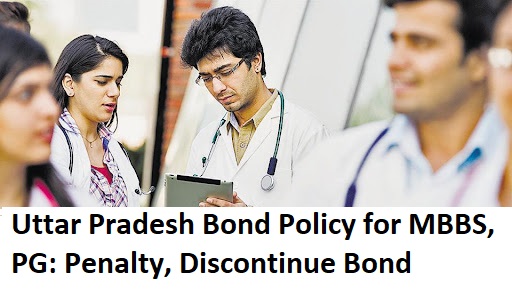
Uttar Pradesh Bond Policy for MBBS, PG: Penalty, Discontinue Bond
The bond policy in Uttar Pradesh for medical education is a formal agreement between medical students and the state government. This policy mandates that students, after completing their medical degrees (MBBS, MD, MS, diploma, etc.) from government institutions, must serve in government hospitals or rural areas for a specified period. If they fail to fulfill this obligation, they must pay a financial penalty as specified in the bond.
This bond policy aims to address the shortage of doctors in government healthcare facilities, particularly in rural and underserved areas of Uttar Pradesh. The policy ensures that the government’s investment in subsidized medical education translates into improved healthcare services within the state.
The Bond Policy in Uttar Pradesh
Service Bond for Undergraduate (MBBS) Students:
Mandatory Service Duration: Upon completing their MBBS degree from a government medical college in Uttar Pradesh, students are required to serve in government healthcare institutions for 2 years.
Penalty for Non-Compliance: If a student does not fulfill this service obligation, they are required to pay a penalty of ₹10 lakhs. This is meant to deter students from skipping the required service period.
Exception for GMC Kannauj: At Government Medical College (GMC) Kannauj, the service bond period is reduced to 1 year with the same ₹10 lakh penalty.
Objective: This bond ensures that the state’s rural and underserved areas benefit from the services of newly qualified doctors who have received government-subsidized education.
Discontinuation Bond for Undergraduate (MBBS) Students:
- If an MBBS student discontinues their course without completing it, they are liable to pay a discontinuation penalty of ₹1 lakh.
- In addition, the student must pay a security deposit (S.D.) of ₹30,000.
- Any fees already paid by the student will be forfeited, meaning the student will not get a refund for the fees they have paid.
Service Bond for Postgraduate (PG) Students:
Mandatory Service Duration: Upon completing their postgraduate studies (MD, MS, or diploma), students must serve in government hospitals for 2 years.
Penalty for Non-Compliance:
-
- For those completing a postgraduate degree (MD/MS), the penalty for not fulfilling the service obligation is ₹40 lakhs.
- For those completing a diploma, the penalty is ₹20 lakhs.
This policy aims to ensure that the government gets a return on its investment in highly trained medical professionals by requiring them to serve the state for a certain period.
Discontinuation Bond for Postgraduate (PG) Students:
- If a student discontinues their postgraduate studies before completion, they are required to pay a discontinuation penalty of ₹10 lakhs.
Rationale Behind the Uttar Pradesh Bond Policy
- Addressing Doctor Shortage: Uttar Pradesh, like many other Indian states, faces a severe shortage of doctors, particularly in rural areas. By implementing a bond policy, the state ensures that its healthcare system benefits from the trained medical professionals it has subsidized.
- Public Investment Return: The government heavily subsidizes medical education, especially in government medical colleges. The bond policy ensures that this investment yields public benefit by requiring graduates to serve in public healthcare institutions.
- Improving Rural Healthcare: The bond policy directs medical graduates and postgraduates to serve in rural and underserved areas where healthcare services are often lacking. This helps bridge the healthcare gap in these regions.
Enforcement of the Uttar Pradesh Bond Policy
- The bond policy is enforced through a legal contract signed by the students at the time of admission. This contract binds the students to fulfill the terms of the service or face the penalty.
- If a student fails to serve the mandatory period or pay the penalty, the state can take legal action to recover the penalty amount.
- For students opting for private jobs or higher studies immediately after their education, fulfilling the bond becomes crucial unless they are willing to pay the specified penalties.

























